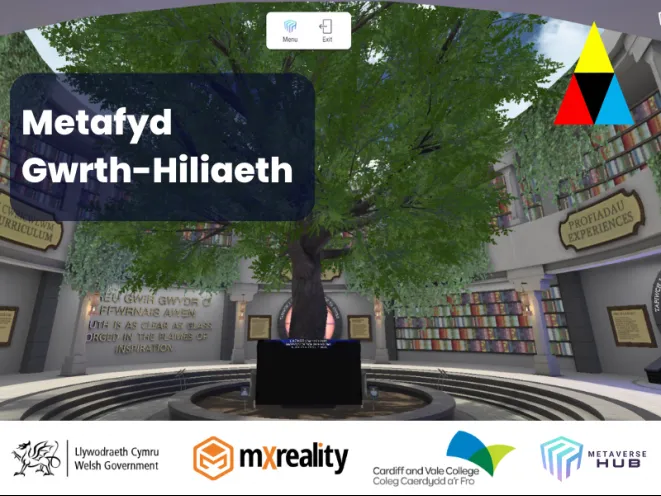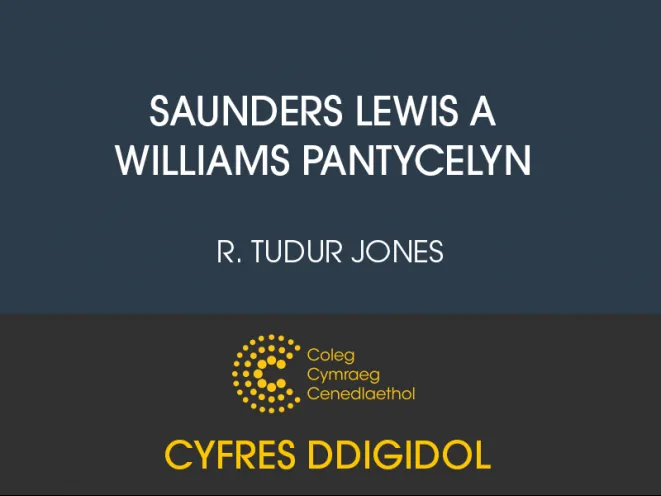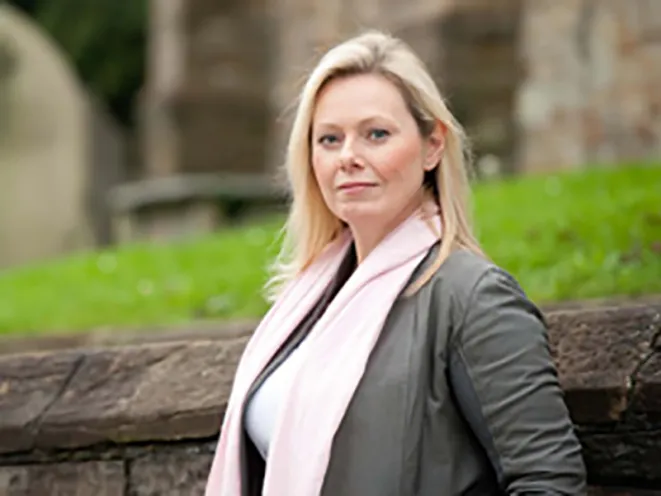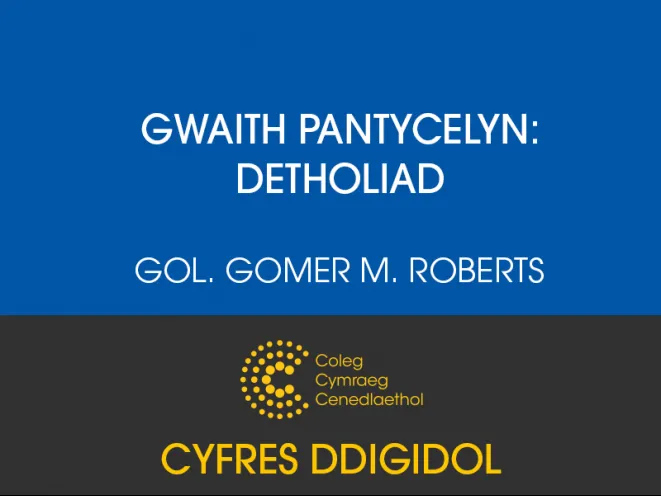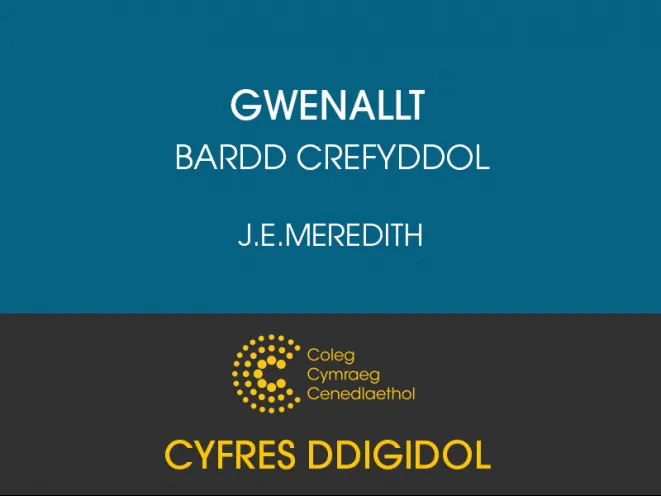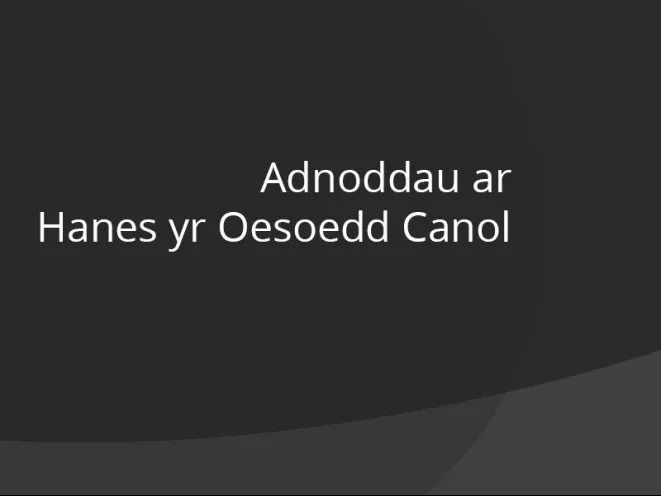This is a podcast in Welsh that is a little different from the usual, and which – as the title suggests – tackles some of life's big questions. The podcast is funded by the Coleg Cymraeg Cenedlaethol, and the series is presented by Dr Huw Williams, a reader in Philosophy at Cardiff University, who holds lively and witty conversations with various friends, including experts and some leading Welsh academics. The premise of the series is that we all reflect on profound issues that are part of everyday life, and discussing and reflecting on these themes is a healthy and important thing. The talks present the discussions through the medium of everyday language in an accessible way; It should appeal to 6th form learners, university students, and other adults who have no prior knowledge of the subjects in question. So join us (and also get ready for a little trip to Roswell...)! The series, with original music, is produced by Osian Gwynedd.
What’s the meaning of life? ... and other big questions
Old Wives Tales
There were no witch hunts in Wales. A surprisingly small number of 'witches' were found guilty and hanged in Wales. Only five, compared to more than 200,000 women who were hanged or burned in western Europe after being accused of 'witchcraft' between 1484 and 1750. There are several ‘old wives tales’ or superstitions about witches where the Welsh experience is mistakenly combined or confused by English or British lore and history. The Coel Gwrach project is an attempt to ensure that Gwen, Rhydderch, Lowri, Agnes and Margaret get their place in history through the medium of Welsh, their own language rather than the language of the court, but also so that that their stories get a second chance to be heard in society.
Welsh Government Anti-Racist Virtual World
In collaboration with mXreality, and working with teams specialising in the subject from Cardiff and Vale College, the Welsh Government has developed an immersive, accessible and expansive 3D metaworld environment, comprising of five areas relating to different themes. They look forward to sharing their experiences, stories and anecdotes with you, and you are invited to engage in an immersive learning experience, which will enhance your understanding of the world. As you explore this world, you are asked to engage with the resources and reflect on their significance. This is an opportunity for you to learn about the cultures and traditions that make up part of our shared identity. The Metaworld consists of the following sections: Experiences The Metaworld of Experiences is situated on a street of representative semi-detached houses in Wales, with access to six houses (three on each side of the street). In each of the houses, you can learn more about the background and interests of the individuals who live there by watching the video playing on the TV and by clicking on some of the interactive items (identified by a three spot icon) in the living room. Immersive Studies The Immersive Studies Metaworld consists of a main lower level area and three upper level areas. The main area has a variety of items of geometrical interest because of their shapes and patterns, which show the connection between mathematics, science and nature. You can learn more about these items by clicking on them. A QR Code is also visible on a panel near some items, which can be scanned with your mobile phone's camera to view a 3D or Augmented Reality (AR) version of the item on your device. The higher level includes: Mathematics room – allows visitors to explore the importance and history of mathematical and geometrical numbers and shapes Hair and Beauty Room – allows visitors to familiarise themselves with the history and origins of hair and beauty Inventions Room – educates visitors about some significant inventions and early contributions to contemporary life World Timeline The World Timeline Metaworld consists of a main central area and four geographic regions, all of which you can access via a tunnel from the central area. Each tunnel displays information that presents the background, identity and image of a representative individual from that region. Each of the four regions (detailed below), comprises four time periods, allowing visitors to experience architecture, images, and representational information in relation to ancient times, medieval times, early modern times, and the world today. The four regions available in this Metaworld are: Africa, Indian Subcontinent, Middle East and Northern Europe. As you move around the world timeline, in the central area and in each of the regions, interactive items you can click on link to videos that present useful additional information. QR Codes are also available in some of the regions, which can be scanned with your mobile phone's camera to view a 3D or Augmented Reality (AR) version of the item on your device. Curriculum This section allows you to engage with a wide range of carefully crafted topics in order to surmise that their plan will be anti-racist. The section consists of the following topics: Sociology Hair & Beauty Health and Social Care Black Feminism Politics Mathematics Film Studies African philosophy English for speakers of other languages Basic Education for Adults Additional Learning Needs Tutorial
Yr Argyfwng Gwacter Ystyr – J. R. Jones
J. R. Jones yn ymateb i argyfyngau dynol y ceir sôn amdanynt yn y Beibl. Cyhoeddwyd hefyd fel rhan o gyfrol Ac Onide
Saunders Lewis a Williams Pantycelyn – R. Tudur Jones
Darlith Goffa Henry Lewis 1987 a draddodwyd gan R. Tudur Jones. Edrycha'r awdur ar ymdriniaeth Saunders Lewis o weithiau Williams Pantycelyn gan ail-ystyried dadansoddiad Saunders Lewis o ddiwinyddiaeth a datblygiad Pantycelyn. Gellir lawrlwytho'r e-lyfr ar ffurf PDF, ePub neu Mobi (gweler Cyfryngau Cysylltiedig uchod). I ddarllen yr e-lyfr ar sgrin cyfrifiadur a/neu i argraffu rhannau ohono, lawrlwythwch y ffeil PDF. I ddarllen yr e-lyfr ar iBooks, Nook, Kobi a'r rhan fwyaf o ddyfeisiau e-ddarllen eraill, lawrlwythwch y ffeil ePub.I ddarllen yr e-lyfr ar Kindle, lawrlwythwch y ffeil Mobi. Mae'r e-lyfr hwn yn ffrwyth prosiect DEChE – Digido
Mamwlad (cyfres 1) (2012)
Cyfres yn olrhain hanes merched arloesol Cymru dros y blynyddoedd. Oherwydd rhesymau hawlfraint bydd angen cyfrif Coleg Cymraeg i wylio rhaglenni Archif S4C. Mae modd ymaelodi ar wefan y Coleg Cymraeg Cenedlaethol i gael cyfrif.
Gwaith Pantycelyn: Detholiad – Gomer M. Roberts (gol.)
Detholiad o gant o emynau William Williams Pantycelyn ynghyd â dwy farwnad, dyfyniadau o gerddi hirach a darnau o ryddiaith. Ceir yma hefyd ragarweiniad i fywyd Pantycelyn, y diwygiad Methodistaidd a rôl oddi mewn iddo. Trafodir arbenigedd ei waith yn gryno yn ogystal.
Gwenallt: Bardd Crefyddol – J. E. Meredith
Darlith a draddodwyd yn wreiddiol ym Mhrifysgol Caerdydd yn Mehefin 1970 gan J. E. Meredith yn ystyried dylanwad Cristnogaeth yng ngherddi Gwenallt. Mae ysgrif nodedig Gwenallt, Credaf, o'r gyfrol o'r un enw wedi ei hailgyhoeddi yma hefyd.
Medieval History Resources
Yn y casgliad hwn ceir adnoddau sy'n cefnogi'r astudiaeth o hanes yr Oesoedd Canol. Mae'r adnoddau'n deillio o brosiect a ariannwyd gan y Coleg Cymraeg Cenedlaethol i greu deunyddiau dysgu cyfrwng Cymraeg safonol yn rhoi cyflwyniadau i bynciau a themâu sylfaenol yn hanes yr Oesoedd Canol.
Llefydd Sanctaidd (2013)
Taith o gwmpas rhai o lefydd mwyaf sanctaidd Ynysoedd Prydain yng nghwmni Ifor ap Glyn. Oherwydd rhesymau hawlfraint bydd angen cyfrif Coleg Cymraeg i wylio rhaglenni Archif S4C. Mae modd ymaelodi ar wefan y Coleg Cymraeg Cenedlaethol i gael cyfrif.
Caradoc Evans: Ffrae My People (2015)
Yn 1915 cyhoeddwyd cyfrol o straeon byrion yng Nghymru greodd storm o atgasedd yn erbyn yr awdur a'i waith. Roedd byd tywyll Caradoc Evans yn 'My People' yn ddarlun hunllefus ac heriol o fywyd y capeli a'r gymdeithas Gymraeg wledig. Gorchmynodd Prif Gwnstabl Caerdydd i gopiau o'r llyfr gael eu llosgi'n gyhoeddus. Disgrifiodd y 'Western Mail' y straeon fel 'the literature of the sewer' gan ddweud mai Caradoc oedd '...the best-hated man in Wales'. Ni welwyd y fath gasineb ym myd y celfyddydau yng Nghymru - gynt nac wedyn. Ond erbyn heddiw prin ydy'r bobl sy'n cofio'r straeon na'u hawdur a gorddodd y dyfroedd yng Nghymru. Gan mlynedd yn ddiweddarach bydd Beti George yn mynd ar drywydd Caradoc Evans gan rannu blas o'i straeon gothic. Bydd yn olrhain ei ddylanwad pellgyrhaeddol ar ysgrifennu Saesneg yng Nghymru ac yn holi beth yn ei fagwraeth yn Rhydlewis, yn ne Ceredigion, a yrrodd Caradoc i greu byd sinistr 'My People'? Gorilla, 2015. Oherwydd rhesymau hawlfraint bydd angen cyfrif Coleg Cymraeg i wylio rhaglenni Archif S4C. Mae modd ymaelodi ar wefan y Coleg Cymraeg Cenedlaethol i gael cyfrif.
Cristnogaeth a Chenedlaetholdeb – J. R. Jones
Trafodaeth gan yr athronydd Cymreig, J. R. Jones am berthynas dirywiad addoli Cristnogol yng Nghymru â chrebachiad hunaniaeth y Cymry a'r iaith Gymraeg.



